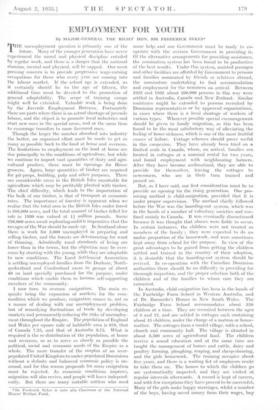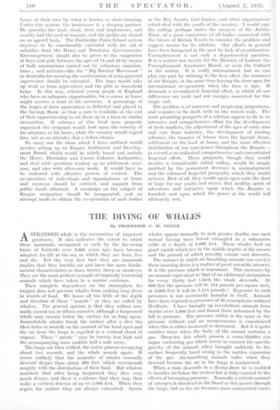EMPLOYMENT FOR YOUTH
By MAJOR-GENERAL THE RIGHT HON. SIR FREDERICK SYKES*
THE unemployment question is primarily one of the future. Many of the younger generation have never experienced the moral and physical discipline entailed by regular work, and there is a danger that the national stamina, mental and physical, will be sapped. Our most pressing concern is to provide progressive wage-earning. occupations for those who every year are coming into the labour market. If the school age is extended, as it certainly should be to. the age of fifteen, the additional time must be devoted to the promotion of, general adaptability. The scope. of training camps might well be extended. Valuable work is being done by the Juvenile Employment Bureaux. Fortunately there are parts where there is an actual shortage of juvenile labour, and the object is to promote local industries and start new ones in the special areas, and at the same time to encourage transfers to more favoured ones.
Though the larger the number absorbed into industry. the better, an organised effort must be made to get as many as possible back to the land at home and overseas.. The limitations to employment on the land at home are, due principally to the conditions of agriculture, but while we continue to import vast quantities of dairy and agri- cultural produce, there must be openings for Home growers. Again, large quantities of timber are required for pit-props, building, pulp and other purposes. There are considerable areas in the British Isles unsuitable for agriculture which may be profitably planted with timber., The chief difficulty, which leads to the importation of.
• the bulk of our timber, is that of transport at economic rates. The importance of forestry is apparent when we realize that the total area in the British Isles under forest is 316,000 acres, and the total amount of timber felled for sale in 1930 was valued at 1 million • pounds. Some 228;000 acres await replanting and itis imperative that the ravages of the War should be made up. In Scotland alone there is work for 5,000 unemployed in Preparing and selling timber, and the forests are deteriorating for want of thinning. Admittedly rural standards of living are lower than in the towns, but the objection may be over-: come by starting with the young, while they are adaptable to new conditions. The Land Settlement Association is settling unemployed families from the Durham, North- uniberland and Cumberland areas in groups of about SO on land specially purchased for the purpose, under eonditions which enable them to become self-supporting members of the -community..
I now turn to oversea emigration. The main res quisite being the expansion of markets for the cam-: moditi•es which we produce, emigration. conies in, not as a means of dealing with our unemployment problem,. but of remedying fluctuations of trade by developing markets and permanently reducing the risks of unemploy- ment throughout the Empire. The population of England and Wales per square mile of habitable area is 678, that of Canada 7.25, and that of Australia 8.75. What is required is the re-distribution of the population, at home and overseas, so as to serve as closely as possible the political, social and economic needs of the Empire as a whole. The mere transfer of the surplus of an over- populated United Kingdom to under-populated Dominions. without a definite and balanced economic policy is uns sound, and for this reason proposals for mass emigration must be rejected. As economic conditions improve, migration will also revive, and people will leave independ-: ently. But there are many suitable settlers who need * Sir Frederick Sykes is inter atia Chairman of the N'ationai Miners' Welfare Fund. some help, and our Government must be ready to cos operate with the oversea Government in providing it Of the alternative arrangements for providing assistance, the nomination system has been found to be productive of the best results. Under this system, assisted passages. and other facilities are afforded by Government to persons and families nominated by friends or relatives abroad, the nominators undertaking to find accommodation and employment for the nominees on arrival. Between 1922 and 1932 about 200,000 persons in this way ,were settled in Australia, Canada and New Zealand. Similar assistance might be extended to persons recruited by Dominion representatives or by approved organizations, in cases where there is a local shortage of workers of various types. Wherever possible special encouragement. should be given to family migration, . as this has been found to be the most satisfactory way of alleviating the feeling of home-sickness, which is one of the most fruitful causes of failure. Cottage schemes should prove useful in this -connexion. They have already been tried on a limited scale in Canada, where, on arrival, families are located in cottages at a nominal rental for two years, and found employment with neighbouring farmers. After they have become acclimatized, they are able to provide for themselves, leaving the cottages to newcomers, who are in their turn trained and passed on.
But, as I have said, our first consideration must be to provide an opening for the rising .generation. One pro- mising method is child-emigration, provided that it is under proper supervision. The method chiefly followed. before the War was the boarding-out system, which was in the hands of a number of voluntary societies and con- fined mainly to Canada, • It was eventually discontinued because it was thought that abuses were liable to occur. In certain instances, the children were not treated as members of time family ; they were expected to ski an undue proportion' of the 'housework, and were sometimes kept away from school for the purpose. In view of the great advantages to be gained from getting the children settled and trained in the country • of their adoption, it is desirable that the boarding-out system should be revived. In co-operation with the Canadian Dominion authorities there should be no difficulty in providing for thorough inspection, and the proper selection both of the children and of the families to whose care they are entrusted.
In Australia, child emigration has been in the hands of the Fairbridge Farm School in Western Australia, and of Dr. Barnardo's Homes in New South Wales. The Fairbridge Farm School accommodates about 350-. children at a time. They are recruited between the ages of 8 and 12, and are settled in cottages each containing about •15 children, under the charge of a matron or house. mother. The cottages form a model village, with a school, church and community hall. The village is situated in about 3,500 acres of agricultural land. The children receive a sound education and at the same time are taught the management of horses and cattle, dairy and- poultry farming, ploughing, reaping, and sheep-shearing, and the girls housework. The training occupies about five years, and there is a waiting list of employers ready. to -take them on. The homes to which the children ga are systematically inspected, and they are 'visited at regular intervals afterwards. A record is kept of careers, and with few exceptions they have proved to be successful. Many Of the girls make happy marriages,•whilst a number of the boys, having saved money frOm their wages, buy farms of their own by what is known as share-farming. Under this system, the landowner is a sleeping partner. He provides the land, stock, farm and implements, and usually half the seed or manure, and the profits are shared on an agreed basis. The Fairbridge Farm School system deserves to be considerably extended with the aid of subsidies from the Home and Dominion Governments. Encouragement should also be given to the emigration of boys and girls between the ages of 14 and 18 by means of bulk nominations carried out by voluntary organiza- tions ; and activities- like the " Big Brother Movement " in Australia for securing the continuation of semi-parental supervision should be extended. The boys would take up work as farm apprentices and the girls as household helps. In this way, selected young people in England who have no adequate opportunities for a career at home might receive a start in life overseas. A percentage of the wages of farm apprentices is deducted and Placed in the Savings Bank, so that a sum is available at the end of their apprenticeship to set them up in a farm or similar occupation. If schemes of this kind were properly organized the emigrant would look upon the country of his adoption as his home, .while the country would regard him, not as an intruder, but a fellow-citizen.
To carry out the ideas which I have outlined would involve setting up an Empire Settlement and Develop- ment Board, which would be widely based and include the Home, Dominion and Crown Colonies Authorities, and deal with questions leading up to settlement over- seas, and also with after-care work. It would have to be endowed with effective powers of control. The co-operation of individuals and organizations at home and overseas should be enlisted, and support from public funds obtained. A campaign on the subject of Empire emigration should be inaugurated, and an attempt made to obtain the co-operation of such bodies as the Boy Scouts, Girl Guides, and other organizations which deal with the youth of the country. I would urge the calling, perhaps under the auspices of the Jubilee Trust, of a joint conference of all bodies connected with the future of British Youth to consider the problem and suggest means for its solution. Our efforts in general have been hampered in the past by lack of co-ordination. Unemployment is not only a departmental question. It is a matter not merely for the 'Ministry of Labour, the Unemployment Assistance Board, or even the Cabinet or the nation. It is really international, but we can play our part by utilizing to the best effect the resources of our Empire, at the same time leaving the door open for international . co-operation when the time is ripe. It demands a co-ordinated Imperial effort, in which all our differences are sunk and our energies concerted for this single end.
The problem is of immense and perplexing proportions, and requires to be dealt with on the widest scale. The most promising prospects of a solution appear to lie in an intensive and comprehensive effort for the development of fresh markets, the adjustment of the ages of entry into and exit from industry, the development of trading schemes, the transfer of labour from the Special. Areas, settlement on the land at home, and the more effective distribution of our man-power throughout the Empire— in a word, a co-ordinated, comprehensive and concentrated Imperial effort. These proposals, though they would involve a considerable initial outlay, would be amply justified by the permanent decrease in unemployment and the enhanced Imperial prosperity which they would achieve. Best of all, they would again open wide the door of hope for our youth and revive that healthy spirit of adventure and initiative upon which the .Empire is founded, and upon which the peace of the world will ultimately rest.







































 Previous page
Previous page